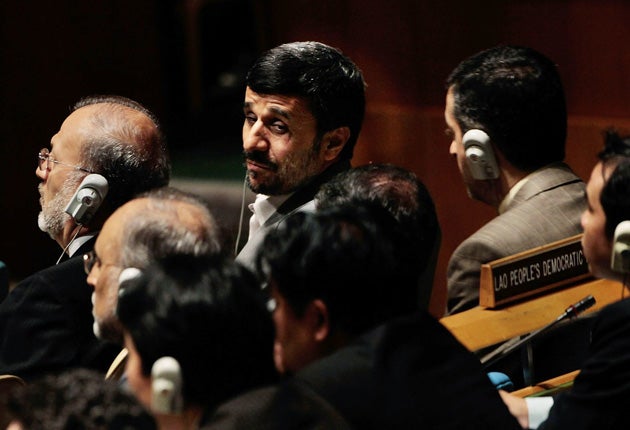Ahmadinejad refuses to curtail nuclear ambitions as weapons talks begin

Your support helps us to tell the story
From reproductive rights to climate change to Big Tech, The Independent is on the ground when the story is developing. Whether it's investigating the financials of Elon Musk's pro-Trump PAC or producing our latest documentary, 'The A Word', which shines a light on the American women fighting for reproductive rights, we know how important it is to parse out the facts from the messaging.
At such a critical moment in US history, we need reporters on the ground. Your donation allows us to keep sending journalists to speak to both sides of the story.
The Independent is trusted by Americans across the entire political spectrum. And unlike many other quality news outlets, we choose not to lock Americans out of our reporting and analysis with paywalls. We believe quality journalism should be available to everyone, paid for by those who can afford it.
Your support makes all the difference.Mahmoud Ahmadinejad yesterday threw down the gauntlet to America and the West, arguing that the US, not Iran, was the real threat to world peace, and leaving little doubt that his country would press on with its controversial nuclear programme, which it says is for purely peaceful purposes.
"Regrettably, the government of the United States has not only used nuclear weapons, but also continues to threaten to use such weapons against other countries, including Iran," the Iranian President said, referring to the recent US nuclear policy review that leaves open the possibility of nuclear retaliation against countries like Iran and North Korea.
The speech to the opening session of the 189-nation Nuclear Non-Proliferation Treaty (NPT) review conference by Mr Ahmadinejad – the only head of state to attend – kicked off four weeks of bargaining at the United Nations in New York, likely to be as acrimonious as it is complex. As he took the rostrum, the British, French and US delegations all walked out of the chamber. The White House later described the speech as "predictable" and full of "wild accusations".
The conference may well not even produce a unanimous final statement, given Iran's hostility to intrusive inspections by the International Atomic Energy Agency, the UN nuclear watchdog, as part of the tighter scrutiny of individual national programmes which Washington and its allies want.
In his address yesterday, Ban Ki-moon, the UN secretary general, set the tone by telling delegates that "the onus is on Iran" to clear up doubts about its programme, generally believed to be aimed at building a nuclear bomb.
Later Hillary Clinton, the US Secretary of State accused Iran of violating the treaty by pursuing nuclear weapons. But her main energies are directed at building Security Council backing for harsh UN sanctions against Tehran, and keeping conference support for Mr Ahmadinejad as restricted as possible.
The stakes could scarcely be higher. An Israeli attack on Tehran's nuclear facilities could unleash a new Middle East war. If Iran does develop a nuclear weapon, several of the country's Arab neighbours may well seek their own, in an arms race that would all but that sound the death knell of the NPT.
For that reason, Washington is showing new interest in calls, led by Egypt, for the Middle East to be declared a nuclear-free zone. This would oblige Israel to come clean about its undeclared arsenal – reckoned to total between 100 and 200 warheads – but would also provide extra leverage against Tehran.
But no such deal will be reached soon, since the US as well as Israel, a non-signatory of the NPT, insist that a regional peace deal must be reached before any such zone comes into effect.
At the same time the US has to contend with accusations of hypocrisy – that while it insists other NPT members keep their commitment not to develop nuclear weapons, it has failed to keep its end of the bargain by not moving to eliminate its own nuclear arsenal.
Mr Ahmadinejad may be seen as the villain of the piece in New York, but he is not alone in his view, expressed on his arrival on Sunday evening, that "the atomic bomb has become a tool for bullying, domination and expansionism".
As proof of its bona fides, the US points to April's strategic arms reduction pact with Moscow, that cuts the warheads deployed by the former superpower foes by a third.
Separately, the Pentagon announced that the total stockpile of US nuclear weapons, either deployed, in reserve or storage, was 5,113 warheads, an 84 per cent reduction from the 1967 peak of 31,225. The release of this hitherto classified data was aimed at showing US transparency on the nuclear issue, in contrast to the obfuscations of Iran.
Join our commenting forum
Join thought-provoking conversations, follow other Independent readers and see their replies
Comments